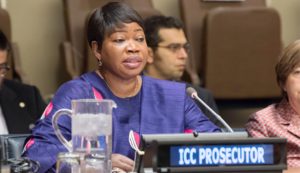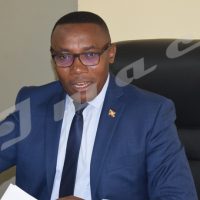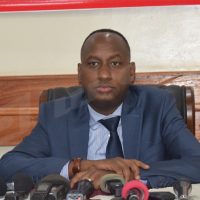On Friday 21 September 2018, the General Assembly led by María Fernanda Espinosa Garcés, President-elect of the 73rd session approved a demand to include a request for an advisory opinion of the International Court of Justice on the provisional agenda of the seventy-third session of the General Assembly.

María Fernanda Espinosa Garcés, President of the seventy-third session of the General Assembly, delivers her remarks at the opening of the general debate of the seventy-third session of the General Assembly. UN Photo/Cia Pak
This request as formulated by the Permanent Observer Mission of the African Union will challenge the legal obligations of states under different sources of international law regarding the immunities of Heads of State and Government and other senior officials. This appeal was initiated by the Republic of Kenya on behalf of the African States Members of the United Nations under item A/73/144 of 18 July 2018.
The Permanent Observer Mission of the African Union has appointed H.E. Dr. Adonia Ayebare, Permanent Representative of the Republic of Uganda to the UN to coordinate the item. “My role is to make sure that it is on the agenda but also to lobby and make sure that during the 73rd session this issue is voted on before we send the question to the 15 judges of the International Court of Justice. It needs to be voted by the majority of two third in the General Assembly,” said Mr Adonia, Permanent Representative of the Republic of Uganda to the UN.
Adonia and his counterparts are convinced that the advisory opinions though non-binding have tremendous consequences on the officials’ immunities. The International Court of Justice is the only judicial organ of the United Nations. If passed, no wonder, this advisory opinion might be used as a buffer or first step to challenge the International Criminal Court that has in the past and until now threatened officials’ freedom of movement outside their countries either for private or official missions.
” This is not about promoting impunity, this is about interpretation of international law, the issue of immunity is as old as state system from the medieval time, the aim of this is to clarify,” explained Adonia Ayebare.
Why attacking the inoffensive ICJ instead of directly crushing the ‘noxious’ ICC during his critical time?
The International Criminal Court is of no doubt the most fearful on the respect of its individual induction.

Fatou Bensouda, Chief Prosecutor for the International Criminal Court (ICC), addresses the sixteenth session of the Assembly of States Parties to the Rome Statute of the International Criminal Court (ICC). UN Photo/Eskinder Debebe
“We support the Rome Statute, but as you know there has been instances of where there has been conflicting obligations within Rome Statute itself,…article 98 confirms that heads of states have immunity but article 27 of the Rome Statutes in the same treaty says they don’t have it,”said Dr. Adonia Ayebare.
Established on 1 July 2002, the ICC has a legitimacy to summons individuals whether holding or not immunity to stand a trial. If the prosecuted person does not appear, an arrest warrant is issued to member states that have legal obligations to arrest them. However, some countries have refused to comply with this regulation. In 2015, President Omar al Bashir freely travelled to South Africa during an African Union meeting. ICC has charged him with genocide and war crimes against his people. South Africa argues that Mr. Bashir was immune from arrest which was rejected by the court. Some African Heads of State have strongly accused the ICC of being a global political tool against the Africa continent. Burundi has been the first country to withdraw from this Rome Charter.
Recently, the Trump administration warned the ICC that he will take serious actions against it if it engages in prosecuting Americans for alleged war crimes in Afghanistan. The United States is ready “with necessary means to protect our citizens and those of our allies from unjust prosecution by this illegitimate court” said John Bolton, the US National Security advisor.
During his speech in the 73rd Session of the UNGA, the President of the US Donald J. Trump showed his disgust towards the ICC, he invites others nations to follow his advice, “I don’t like it and nobody should like it”, Said Mr Trump.
Now would be the right time for African member states that have been piqued by the ICC to challenge this institution instead of ICJ. They might have taken advantage of its ruined credibility and follow Burundi track to defeat their common enemy. Is seeking legal interpretation a step towards it? Time will tell.



















 IWACU Open Data
IWACU Open Data

